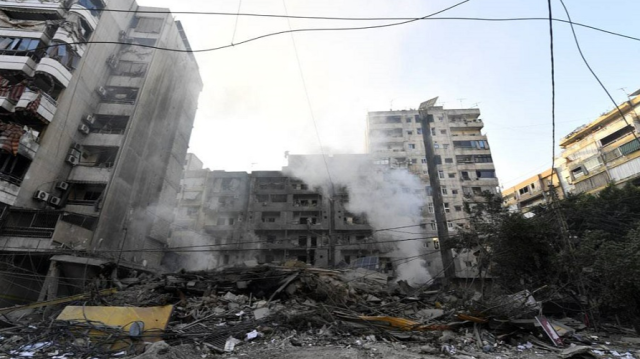

File photo
Ali Larijani meets with Lebanese official in Beirut, denies undermining cease-fire initiatives
Iran is committed to resolving Lebanon's crisis and does not aim to sabotage any initiative or agreement, Iranian Supreme Leader Ali Khamenei's adviser, Ali Larijani, said Friday during his visit to Lebanon.
Larijani made the remarks after meeting with Lebanese Parliament Speaker Nabih Berri at his Beirut office, according to a statement from Berri's media office.
“We hope displaced Lebanese citizens can return to their homes soon,” Larijani said, adding that his discussions with Lebanese officials focused on addressing the country's challenges.
He affirmed: “We support any decision made by Lebanon's resistance (Hezbollah) and government.”
In response to speculation about whether his visit aimed to undermine US-backed initiatives or agreements, Larijani clarified: “We are not here to sabotage anything. We seek to resolve Lebanon's problems.”
“The real disruptor is (Israeli Prime Minister Benjamin) Netanyahu and his allies. It's crucial to distinguish between friends and foes,” he added.
Local media reports indicated Thursday that US Ambassador to Lebanon, Lisa Johnson, presented a cease-fire proposal to Berri, although details of the proposal were not disclosed.
On talks about a cease-fire and the implementation of Resolution 1701, Larijani revealed that Berri provided him with “detailed insights” during their meeting.
Resolution 1701, which was adopted on Aug. 11, 2006, demands a complete cessation of hostilities between Lebanon and Israel and the establishment of a demilitarized zone between the Blue Line -- the de facto boundary between Lebanon and Israel -- and the Litani River, allowing only the Lebanese army and the United Nations Interim Force in Lebanon (UNIFIL) to possess weapons and military equipment in the area.
Earlier, Larijani met with Lebanese caretaker Prime Minister Najib Mikati at the Grand Serail in central Beirut, according to a statement from Mikati's media office.
During the meeting, Mikati stressed Lebanon's commitment to implementing Resolution 1701 fully and without amendments or misinterpretations. He called for “support for Lebanon's position, national unity, and avoiding stances that may create sensitivities among different factions.”
The Lebanese premier also highlighted the priority of halting Israeli aggression, achieving a cease-fire, and ensuring the resolution's comprehensive implementation. He noted that ongoing efforts aim to reach a consensus.
Larijani reiterated Iran's support for any decision by the Lebanese government, particularly regarding Resolution 1701, and for electing a president agreed upon by the Lebanese people.
According to Israeli media, Washington recently proposed a plan requiring Hezbollah to withdraw north of the Litani River, with the Lebanese army deployed in the south.
The proposal also calls for preventing Hezbollah from re-establishing positions in the region and halting the transfer of weapons from Syria to the group.
However, Israel insists to target Hezbollah in Lebanon even after any agreement, a stance strongly rejected by Lebanon.
Hezbollah has emphasized that any indirect negotiations with Israel must be based on two conditions: a cease-fire and the full, undiminished protection of Lebanon's sovereignty.
Israel launched an air campaign in Lebanon against what it claims are targets of the Hezbollah group in late September, in an escalation from a year of cross-border warfare.
Nearly 3,400 people have been killed, over 14,400 injured, and more than 1 million people displaced by Israeli attacks since last October, according to Lebanese health authorities.
Israel launched an incursion into southern Lebanon on Oct. 1 this year.
#Lebanon
#Ali Larijani
#Hezbollah
#Iran
#Israel
